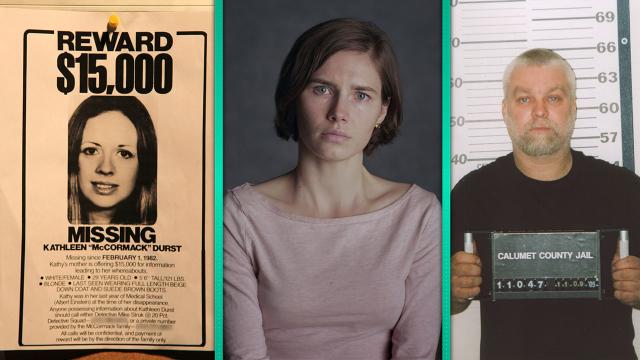Amanda Knox, the original Netflix documentary about a 20-year-old American girl in Italy found guilty and later exonerated of murdering roommate Meredith Kercher, is the latest true-crime sensation to get a second look as directors Rod Blackhurst and Brian McGinn let the key players involved -- Amanda Knox, co-defendant and ex-boyfriend Raffaele Sollecito, Italian prosecutor Giuliano Mignini and Daily Mail reporter Nick Pisa -- tell their side of the story.
"We really hope that the film is a portrait of each of these people who are caught up in something far bigger than them," Blackhurst tells ET, adding that "nobody had really taken the time to understand who they were as individuals."
Following Kercher's death in 2007, Knox found herself trapped in the middle of a media circus when she and Sollecito became the main suspects in the case and, in 2009, were found guilty and sentenced to 26 years in prison. In 2011, both were acquitted and freed following an appeal that ruled there had been insufficient proof in the case. Both Knox and Sollecito were eventually retried and found guilt again, only to have the Italian Supreme Court in 2015 definitively exonerate both of any guilt in Kercher's murder.
The story became tabloid fodder as soon as the investigation started, blurring the lines between hard news and soft news. "You couldn't have asked for better material," Pisa says in the film. Soon Knox became known as "Foxy Knoxy" -- a moniker Pisa lifted from Knox's Myspace page -- with every detail of her life subject to interpretation by the press. "Google the name 'Amanda Knox' and you get 7.1 million hits," Knox says.
In February 2011, before Knox or Sollecito had even been acquitted, Lifetime debuted a dramatized version of the events starring Hayden Panettiere and Marcia Gay Harden. "This legal proceeding was turned into entertainment," says Blackhurst.

Amanda Knox, co-defendant and ex-boyfriend Raffaele Sollecito, Italian prosecutor Giuliano Mignini and Daily Mail reporter Nick Pisa.
Netflix
"What we saw immediately when we started working on this in 2011 -- even with the sheer number of cameras and reporters covering the story -- was that nobody actually had an understanding of what had happened or maybe what were the objective facts that existed," says Blackhurst, who, alongside McGinn, became interested in separating truth from fodder. "The things that people had latched onto were the far more salacious, exciting and fear-inducing headlines."
"We wanted to both understand why that had happened and what it would feel like as well for each of these people caught up inside of this," he continues.
It was for that reason that the directors felt it was "really worth" telling this story from the first-person perspective, with the four personalities sitting down for an unfiltered conversation about their account of what happened. And it was for that reason the film took nearly five years to complete.
MORE: 'Cleveland Abduction' and 6 Lifetime True-Crime Movies You'll Never Forget
"While everyone else was battling over getting the news out first, we spent a lot of time building relationships and building trust with these people," McGinn says. "After two and a half years of talking to people and doing research, Amanda came to us and said she wanted to do an interview. Then, shortly after that, after the final Supreme Court verdict in 2015, Giuliano decided to participate as well."
With both of them involved, McGinn knew they finally had a film "because we had two opposing viewpoints looking at the situation, each with extremely unique and fascinating human backstories," he says.
While many reporters, filmmakers and writers came before them "looking through the lens of the narrative they already subscribed to," Blackhurst says that they took the time to make clear they were interested in listening. "We want you to talk to us freely and openly."
The result is emotional and, at times, chilling testimonials from everyone involved, with some speaking in a way that is almost shocking because it's so personal. "These people have all had their lives defined by the events of the past eight, nine years," Blackhurst says. "They're all trapped and caught up in these narratives that have been written and created about them. While making the film, we found that a lot of the context had been lost in the moment as they were presented in the media."
"What I'm trying to convey is a regular person like me ... could be caught up in this nightmare where they're portrayed as something they're not," Knox told Good Morning America on Thursday, before the film was released on Netflix.
"For us, the film was really trying to uncover who these people were," McGinn says, adding that whether it provides Knox, Sollecito or Mignini any closure is not for the directors to say. "We're not in their shoes��� We'll see how that plays out in the coming months."
"I'm moving on with my life," Knox told GMA.

